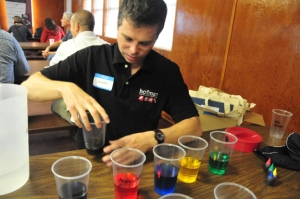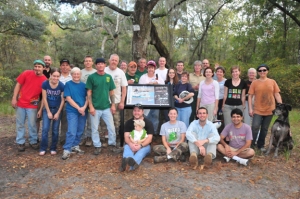Agriculture News
Hoffman Institute co-hosts karst groundwater workshops, cave cleanup
- Tuesday, February 21st, 2012
Groundwater is one of the most vital resources in karst landscapes, such as those found in southcentral Kentucky and the entire peninsula of Florida.
In November 2011, four members of the WKU Geography and Geology Department’s Hoffman Environmental Research Institute — Dr. Jason Polk, Dr. Leslie North, staff member Jonathan Oglesby and graduate student Kamal Humagain from Nepal –traveled to west-central Florida to host two workshops and a cave cleanup to promote understanding of groundwater in caves and karst environments, practices for protecting groundwater, and educate about human impacts to water resources in karst areas. These workshops were hosted in collaboration with nonprofit land trust The Karst Conservancy and sponsored through a Southwest Florida Water Management District Community Education Grant.
The first of the two workshops, “A Karst Conversation,” featured two short multimedia presentations (What is Karst, produced by the University of South Florida Karst Information Portal and No Reason, produced by Circle of Blue), presentations by local geologists, groundwater scientists and land managers, a guided panel discussion involving residents, and hands-on activities designed to illustrate the interconnectedness of karst systems.

Hoffman Institute staff member Jonathan Oglesby prepared the "Aquifer Awareness" activity. Workshop attendees used dyed water to learn about the inputs and outputs of a karst aquifer system and how easily it can become polluted from human activity.
A highlight of this workshop was the “Aquifer Awareness” group exercise wherein participants simulated tracing flowpaths of rainwater, pollution, groundwater and various inputs and outputs of a karst system using dyed water. Workshop presenters included Dave DeWitt from the Southwest Florida Water Management District, Grant Harley from the University of Tennessee, Dr. Spencer Fleury, Colleen Werner of the Withlacoochee State Forest, and Dawn Velsor and John Burnett of the Hernando County Planning Department.
The Dames Caves Complex was the focus of the second workshop held in the afternoon, which involved an educational session to learn about the caves and their connection to the local groundwater system, and several site improvement activities.

Workshop attendees cleaned up trash and pollutants around the Dames Caves site to help protect groundwater that could be contaminated if these were to be washed into the aquifer system.
Dames Caves Complex is a heavily visited and often negatively impacted karst feature located in west-central Florida in the Withlacoochee State Forest. To raise awareness about the sensitivity and importance of this karst feature with regard to groundwater supplies, workshop participants were led on an educational tour of the Complex and engaged in a variety of cave cleanup and restoration activities. These included installing an interpretative sign about karst groundwater and the Dames Caves Complex, which was developed by the Hoffman Institute team and installed by members of The Karst Conservancy.
Karst Conservancy Directors Grant Harley from the University of Tennessee and Robert Brooks from Brooksville, Fla., led groups into the Dames Caves complex to conduct cleaning of graffiti from walls, while Directors Tom Turner and Lance Elder organized cleanup efforts to remove garbage and trash from nearby Peace Sign Cave, also part of the system. Karst Conservancy associate Mike Stonehocker led the effort to install the signage permanently at the site to withstand the elements and heavy visitation, while creating a natural look to the sign to help it flow with the surrounding landscape.
Withlacoochee State Forest Recreation Coordinator Joe Tyberghein commented: “The sign looks great! You have provided a tremendous service to the management of our cave areas. Thank you for taking the time to make a difference.
One local participant noted: “This activity has really brought to my attention the importance of our local groundwater and how karst environments are unique and require understanding and preservation in order to protect our water resources.”

Members of the Dames Caves Cleanup Workshop gathered around the newly installed interpretive signage about karst groundwater to help educate the hundreds of weekly visitors.
More than 40 participants attended the workshops. These included representatives from the Withlacoochee State Forest, seven Florida counties, the water management district, local caving grottos, and the local Audubon society, among others. The diverse audience provided the opportunity for multi-perspective discussions and networking to develop future collaborations toward the goal of preserving the karst environment and the precious groundwater resources it provides.
Subsequent monitoring of the Dames Caves site reveals increased visitation by families and positive feedback about the signage and ongoing efforts toward turning the site into an educational preserve. With continued support from the local community, this site has potential to become a significant source for environmental education about the local karst landscape, including opportunities for student and community engagement projects.
“Public outreach is a critical component of the Hoffman Institute’s educational mission,” noted Geography and Geology Department Head Dr. David Keeling. “T

